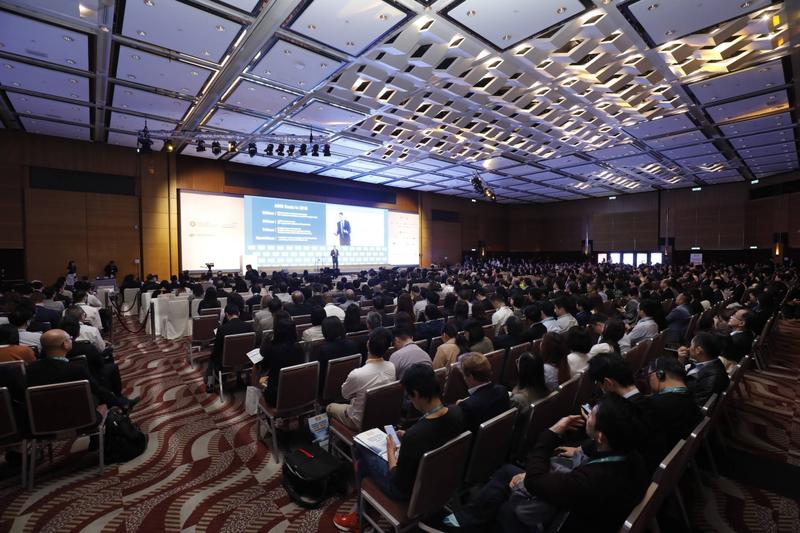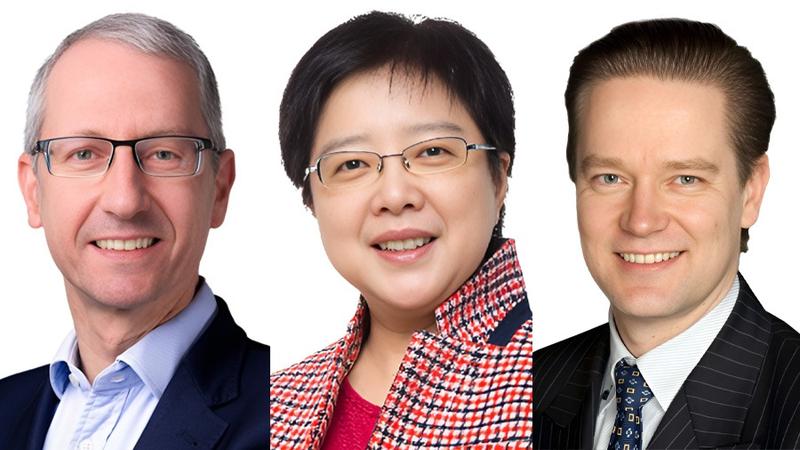
Guests listen intently to a presentation at the Visionary Forum during the previous Digital Economy Summit in 2019. (PHOTO PROVIDED TO CHINA DAILY)
Far from being an attention-seeking glossy buzzword or a trick of one’s imagination, “smart city” mindsets are right here, and, rather than shaping our future, are reshaping our present by breeding a smorgasbord of innovations and applications to rectify the consequences wrought by the pandemic.
This smart normal will make the Digital Economy Summit — themed “Emerging with Resilience: Fostering a Smarter Future” and co-organized by Cyberport and the Hong Kong Special Administrative Region government, scheduled for April 13-14 — all the more apt and seminal. Slated to attract 4,000 attendees, including government officials, business leaders and technology experts in smart urban development from over 40 regions, and featuring more than 80 renowned speakers, the summit will serve as a prompt for an open discourse on how smart city technologies and the intelligent implementation of policies could supercharge smart economies as well as fast-track the formation of future-proof digital societies.
Having their feet on the ground, global tech giants and prominent industry experts will exchange insights on how the exponential growth of future technology in the metaverse, artificial intelligence, the cloud, 5G, smart cities and more will define the new normal for smart economies and re-create future sustainable societies.
Dr Will Cavendish, global leader of digital services at Arup — a global collective of designers, advisers, and digital experts dedicated to sustainable development — will deliver a keynote speech titled “Digital Innovation Driving Low-Carbon and Nature+ Development”.
One of the big problems motivating Dr Cavendish is the massive potential carbon impact of the demolition of existing buildings and infrastructure. The facts are straightforward, as he describes: “When we demolish existing structures to build new, we’re effectively generating new emissions. The carbon used to construct existing buildings and other structures is significant, and every time we demolish to build new, we then create more emissions. And those emissions are released into the atmosphere, contributing to global climate change.”
Smart innovations could be a key solution to such potentially devastating emissions, enabling us to retain and renew our existing buildings, while creating new from old, says Cavendish, referencing digital tools that could keep embodied carbon where it is.
“Being smart” has become a newly adopted metric for gauging a city’s livability, vitality, competence and resilience against precariousness. The Organization for Economic Co-operation and Development defines smart cities as “cities that leverage digitalization and engage stakeholders to improve people’s well-being and build more-inclusive, sustainable and resilient societies”. At its core, a smart city is designed to better serve its “people” or its dwellers. In other words, digital innovation, which is often taken as shorthand for “smart”, is not the end of a smart urban transformation. Rather, it is the improvement of people’s quality of life through seamless engagement among all stakeholders, including governments, businesses, civil society and academia, to maximize the access to smart resources, be they technologies, information or education.
 More than 80 renowned speakers, including (from left) Dr Will Cavendish, global leader of digital services at Arup; Winnie Tang, founder and honorary president of the Smart City Consortium in Hong Kong; and Jukka Viitanen, CEO of Resolute HQ Inc, based in Finland, will share their insights at the 2023 Digital Economy Summit on April 13-14. (PHOTOS PROVIDED TO CHINA DAILY)
More than 80 renowned speakers, including (from left) Dr Will Cavendish, global leader of digital services at Arup; Winnie Tang, founder and honorary president of the Smart City Consortium in Hong Kong; and Jukka Viitanen, CEO of Resolute HQ Inc, based in Finland, will share their insights at the 2023 Digital Economy Summit on April 13-14. (PHOTOS PROVIDED TO CHINA DAILY)
Now that “people” take pride of place in smart city development, “Smart People” are the key among the other five ingredients — smart economy, smart mobility, smart governance, smart environment, and smart living — in the creation of a smart city, and are also the overriding force to fulfill a smart economy, says Winnie Tang, founder and honorary president of the Smart City Consortium in Hong Kong, who will give opening remarks on the first day of the summit.
By “smart people”, she means people who are open-minded about collective open resources at their disposal, and talents who are savvy about utilizing the data pool to their legitimate benefit. While applauding the SAR government’s venture in opening up a host of data sets from early 2019 because of a belief that publicizing data will automatically yield benefits if all sectors make use of the open resources, Tang says she finds it regrettable to observe a tacit hesitancy and apprehension among the public toward using the open data. She cites the findings of a survey showing that only 20 percent of those interviewed had used open data — offbeat proof of open data’s low utility despite its ready availability.
“It is necessary to strengthen relevant education and professional training to cultivate more local smart people so as to realize the huge potential value of open data,” Tang says.
Tang, also the founder and chairman of Esri China (Hong Kong) Ltd, specializing in geographic information system (GIS) technology, will also moderate the first panel discussion after a keynote speech on the vital role of geospatial infrastructure in smart city development and the potential effects of geospatial data usage in future cities.
She deems a one-stop data platform, the Common Geospatial Information System Platform (CGISP), for all stakeholders to be the best possible solution. “Large-scale infrastructure projects in Hong Kong and overseas, such as the Crossrail and the Elizabeth line in London, are prime examples of how CGISP can facilitate planning, construction, monitoring and maintenance.
“Hong Kong pioneered the use of advanced technologies such as GIS 25 years ago,” she acknowledges. “To contribute to the overall smart city development of the (Guangdong-Hong Kong-Macao) Greater Bay Area, Hong Kong should break through the geographic boundaries, strengthen integration with the rest of the GBA cities, and formulate long-term solutions for housing supply via the application of such innovative technologies as GIS.”
It’s no coincidence that we resort to cities for potential “smart panaceas” in our quest for quality-of-life and future-proof solutions.
“Cities act as critical and impactful test beds and platforms for supporting the major technological breakthroughs in digitalization, sustainability and services,” remarks Jukka Viitanen, CEO of Resolute HQ Inc, based in Finland. He will join the panel discussion on geospatial data application in smart city development.
Cities can not only crowdsource an intelligent mass of actors and ideas to ignite and maintain the innovation process, but also provide practically “functional test sites in real life context to the innovation creators.”
Viitanen suggests recalibrating the long-existing city structure into distinguishable innovation districts, which “emerge as thematic conglomerations of talent, actors and related processes. They serve as lighthouses which can be identified, seen and organized for purposeful places to boost and promote innovation activity.
“Each innovation district can promote a selected theme, and structure its activities to boost either knowledge-driven, business-driven or innovation-driven collaborative processes,” Viitanen says.
Smart cities are not a mirage in the distance any more. They are surfacing from a collective wisdom of talents and technologies. Action is in full swing, and “action is the key,” concludes Viitanen.
The two-day summit will manifest the agency of collective knowledge, perspectives and foresights per se, with a smorgasbord of speeches and sharing sessions presented. One of the highlights will be a speech titled “Seizing Opportunities Arising From Smart City Development in the GBA”, to be followed by a panel discussion featuring Gary Yeung, president of the Smart City Consortium; William Gee, vice-chairman of the Asia Public Key Infrastructure Consortium; Wei Jiao, deputy director of the Science & Technology Innovation Division of the Qianhai Administrative Bureau in Shenzhen; and other experts.
Web3, an indispensable piece of the smart city puzzle, is bound to catalyze an overhaul of business models, in which users will become the proprietors and beneficiaries of assets and data. In his keynote speech, Dr Xiao Feng, chairman of the board, HashKey Group, will provide insights into how Web3 will enable a new model for the economy. An in-depth dialogue will follow, revolving around “Building a Comprehensive Web3 Ecosystem”, joined by experts such as Adelyn Zhou, chief ecosystem growth officer of Chainlink; and David Lee from Global Fintech Institute, who is a professor at Singapore University of Social Sciences. The involvement of governments and policymakers, as well as the importance of other cutting-edge technologies, such as 5G and autonomous driving, will also be touched on throughout the summit. This will be a golden opportunity to pick the brains of a constellation of prescient smart-city insiders who will paint a picture of cities lying a stone’s throw away.
If you go
Digital Economy Summit
Date: April 13-14
Venue: The Hong Kong Convention and Exhibition Centre


